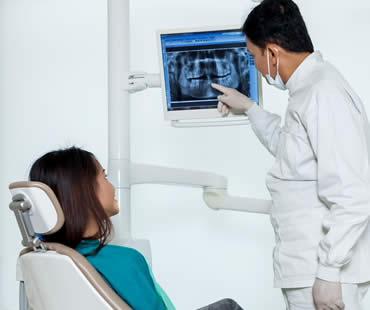
What is a dental bridge?
- Dental bridges make a bridge between two anchor teeth and are meant to fill a space left by a missing tooth. Teeth can be missing due to trauma, decay or some type of natural loss. Dental crowns cap the anchor teeth, giving the bridge stability and giving the replacement tooth the strength to function as a natural tooth.
What is a dental crown?
- Dental crowns are a restorative treatment meant to protect a tooth that has gone bad due to cracking, acute decay, or has received root canal therapy. A crown is crafted to fit in your mouth and to function exactly as your natural tooth would. They work by covering the damaged tooth entirely and can change the shape or alignment of the prior natural tooth.
Isn’t a dental crown the same thing as a dental cap?
- A dental cap and a dental crown are two different terms for the same thing.
What are dental crowns made of?
- Dental crowns can be made of 100% ceramic (porcelain), porcelain-fused-to-metal, or gold or other metal alloy, including zirconia. Metal alloy dental crowns are typically stronger and more suited for back teeth.
Do dental crowns look natural?
- Crowns made from porcelain or ceramic can be very natural looking. Many materials have excellent translucency, and mimic your natural teeth very well.
Is a dental bridge an option for me?
- Are you missing a tooth? Are your adjacent teeth healthy and stable? If so, dental bridge treatment may be right for you.
Are there options available to me other than dental bridges to replace missing teeth?
- The best alternative option to replace a missing tooth is a dental implant. Dental implants can restore one or more teeth by being placed directly into the jawbone, fusing securely over time.
If you’re considering moving forward to replace your missing tooth or teeth, discuss options with your cosmetic dentist. Get the answers you need to determine if dental crowns or dental bridges can help you reach your smile goals.
We look forward to seeing you in our Haymarket dental office
A beautifully white smile is often perceived as a sign of youth and vitality, but over time it can gradually fade. Eating certain foods or drinking dark-colored beverages, taking particular medications and simply aging can all take its toll on your teeth. It’s hardly surprising that tooth whitening has become one of the most popular cosmetic dental procedures in recent years. Professional teeth whitening is safe and effective and can quickly rejuvenate your smile. If you’re thinking about whitening your teeth, there are several options to choose from which include:
In-Office Whitening
In-office teeth whitening is hugely popular, as you can literally book a lunch time appointment and leave with a dazzling white smile. Surface stains can quickly be eliminated, and teeth can be brightened by up to eight shades in just an hour. This option is the most expensive, and you don’t have much control over the final results. Your dentist in Haymarket will activate the bleaching gel with a special light so the final result should be a stunning white smile.
Custom-Made Take-Home Teeth Whitening Kits
Not everyone wants to whiten their teeth so quickly, and custom-made whitening trays enable you to safely bleach teeth in a more controlled manner. Your Haymarket cosmetic dentist will take impressions of your teeth that are used to fabricate custom-made whitening trays. You’ll be shown how to use these trays, and should wear them for as long as directed. Most people will begin to notice real results within a few days, but they generally need to be used for two or three weeks to achieve optimum effects.
Over-The-Counter Teeth Whitening Kits
Over-the-counter whitening kits come in the form of trays and whitening strips and can cost between $20 and $50 so it’s tempting to think they will save you money. However the bleaching gels contained in these kits are not as strong as those available to your dentist. In addition, there’s the possibility these kits could irritate your gums as ill-fitting whitening trays can allow the gel to leak out.
Our dental office is located in Haymarket

Are you or someone in your family missing a single tooth due to an accident, infection, or fracture? If you are missing a single tooth for any reason, a single tooth dental implant can replace both the natural tooth and its root. The best, long-term option for restoring a single missing tooth is a dental implant fitted with a crown.
To place the implant, a small titanium post is inserted into the jawbone. This anchor provides a “root” for the placement of the implant that looks, feels, and functions like a natural tooth. These “anchors” are extremely compatible with bone and attach to the jawbone and gums to become a base for the crown. A temporary tooth can be placed while the dental implant integrates with your natural bone to form a foundation for a crown. Once the implant has fused to the bone, the final step in the treatment is the placement of the permanent crown onto the dental implant.
One of the advantages of a dental implant is that it allows you to replace a single tooth without sacrificing the health of neighboring teeth. Other treatments, such as bridges, require the adjacent teeth to be ground down to support the appliance. Grinding down the teeth damages tooth enamel and structure. Also, a single implant can be more aesthetically pleasing and easier to keep clean than a bridge.
It is of vital importance to replace even one missing tooth, as leaving it untreated can cause bone loss, compromised chewing ability, as well as an unattractive smile. If you have one missing tooth, or a tooth that needs to be removed due to damage or decay, the best and most natural option is a single tooth dental implant.
If you need a dentist in Haymarket contact us today

Dental implants provide an innovative solution for replacing missing teeth. A titanium rod is surgically placed in the jaw so that it can fuse with the bone, and ultimately an artificial tooth is placed on top to complete the process. This type of surgery is an intricate process that should be performed by a qualified and experienced dentist or oral surgeon. Even patients under the care of the most skilled professionals sometimes encounter problems with dental implants. Here are some risks to watch out for with this procedure.
Infection:
The most common concern with nearly any type of surgery is the possibility of infection. Oral surgery is no different, with the risk of infection related to tissue and gums. Carefully following the dentist’s instructions for aftercare and any restrictions is vital in avoiding infection.
Nerve and tissue damage:
During dental implant surgery, various nerves and tissue are involved. A qualified healthcare professional should have years of experience in carefully performing the surgery so that tissue and nerves are not damaged in the process.
Improper fusing:
One key element of a successful dental implant is for it to fuse properly with the jaw bone. If that does not occur, pain or other issues may result. The dental implant must be attached carefully and the patient must follow the recovery guidelines in order to help guarantee a successful outcome.
Dental implants are becoming more and more common to restore the function and appearance of a healthy mouth. The best way to steer clear of the risks associated with this procedure is to seek treatment from a reputable and well-established professional. Between having a high-quality procedure and making smart choices throughout recovery, the likelihood of a successful dental implant increases.
Our dental office is located in Haymarket

When you visit the dentist, you often see other professionals in the office. Usually, the dentist will have a hygienist and a dental assistant as part of the team. While their roles aren’t the same as the dentist’s job, these individuals do play an important part in your dental care. Understanding what the hygienist and dental assistant do can make you feel more comfortable at your dental appointments.
The Dental Assistant
To become a dental assistant, an individual usually completes course work through a community college or technical school. This training will provide hands-on experience before the dental assistant works in an actual dental practice. A dental assistant can serve many functions, including assisting the dentist during treatment, taking impressions, sterilizing instruments, and making temporary crowns for patients. Dental assistants also welcome patients and help them feel comfortable in the dental office.
The Dental Hygienist
At a minimum, a dental hygienist must earn an associate’s degree, though many hygienists choose to obtain four-year degrees. Additionally, hygienists must be licensed in the states where they practice. The dental hygienist is generally responsible for taking patient x-rays, performing an initial periodontal assessment, and cleaning your teeth. During your appointment, the hygienist will also offer tips on home hygiene to help you maximize your oral car routine. A dental hygienist may also perform deep cleanings for gum disease, apply fluoride, remove sutures, and administer local anesthetic.

One extremely common fear shared by many people is a fear of the dentist. Patients who possess this fear are often anxious and nervous about the sights, sounds and smells of a dentist’s office. Just imagining a routine visit can leave someone shaken and fearful, unable to sleep the nights prior to treatment.
Patients who share this common fear can put off necessary dental work. A fear of pain or needles can lead a patient to tolerate tooth pain or signs of infection in the mouth. If this sounds like you, talk to your dentist about sedation dentistry options.
Many people assume you must be fearful at a phobic level to benefit from sedation dentistry. This isn’t true! Sleeplessness, anxiety and low-level fear can all be helped with some form of sedation dentistry. Oral sedatives can be prescribed to be taken the night prior to a dentist visit, as well as the day of, to ensure a restful night’s sleep and an easy day before treatment.
Sedation dentistry during procedures is very safe, as you are monitored at all times by the dentist. Because of the deep level of relaxation possible utilizing sedation dentistry, more work can be done in a single visit, cutting down on trips to the dental office.
General dentistry procedures such as checkups, regular cleanings and cosmetic treatments can all be performed on a patient being treated with sedation dentistry. For a patient with fear and anxiety, each therapy can be made better with the addition of sedation dentistry.
Over time, with the use of sedation dentistry, some of your fears and anxieties can begin to lessen. Positive experiences can build up mental and emotional trust in the dentist, and patients can find that they need less and less of the sedation to feel comfortable.
We treat patients from Haymarket and the surrounding area









